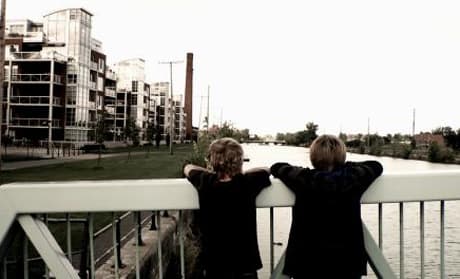It's always a joy to experience a younger generation's mimicking of a pretentious film movement from prior decades, especially when said movement is vaguely French and involves attempts to capture reality, something impossible based on the sheer fact that there is a camera with a limited frame, a selected progression of editing choices and a subject consciousness of said camera.
St-Henri, The 26th of August utilizes the premise of the short film A Saint-Henri le Cinq Septembre, wherein Claude Jutra, Michel Brault and other emerging NFB filmmakers roamed the streets of St-Henri trying to capture the spirit of the neighbourhood through the images and people. The main distinction here is that this is a feature-length documentary with 12 directors rather than four, capturing a similar vibe, but for a much longer time.
Of the many things that Cinq Septembre needed, an extended running time wasn't one of them. While exceedingly tedious, this modern homage to a working-class community does partially capture the differences and similarities of a changing landscape, noting the dramatic, dilapidated change in structure and class division, but a similar street spirit. Following a variety of subjects through their day, we get an impression of the external, urban, bohemian vibe of the city as performed by people constantly exaggerating their behaviour for the camera.
Some brief interviews with a pair of homosexual Mohawk Indians shed some interesting light on forms of marginalization, as does a discussion with a bottle-collecting welfare case donning some seriously unfortunate orthodontia, but these moments are rare. Mostly, we're subject to strained slice-of-life monotony with a focus on vague hipsters, people of the earth and youthful idealists under the impression that graffiti is more than the animalistic marking of territory.
Ultimately, it gives us more of a sense of the collective undergraduate ideologue of the filmmakers than of the community itself.
St-Henri, The 26th of August utilizes the premise of the short film A Saint-Henri le Cinq Septembre, wherein Claude Jutra, Michel Brault and other emerging NFB filmmakers roamed the streets of St-Henri trying to capture the spirit of the neighbourhood through the images and people. The main distinction here is that this is a feature-length documentary with 12 directors rather than four, capturing a similar vibe, but for a much longer time.
Of the many things that Cinq Septembre needed, an extended running time wasn't one of them. While exceedingly tedious, this modern homage to a working-class community does partially capture the differences and similarities of a changing landscape, noting the dramatic, dilapidated change in structure and class division, but a similar street spirit. Following a variety of subjects through their day, we get an impression of the external, urban, bohemian vibe of the city as performed by people constantly exaggerating their behaviour for the camera.
Some brief interviews with a pair of homosexual Mohawk Indians shed some interesting light on forms of marginalization, as does a discussion with a bottle-collecting welfare case donning some seriously unfortunate orthodontia, but these moments are rare. Mostly, we're subject to strained slice-of-life monotony with a focus on vague hipsters, people of the earth and youthful idealists under the impression that graffiti is more than the animalistic marking of territory.
Ultimately, it gives us more of a sense of the collective undergraduate ideologue of the filmmakers than of the community itself.
